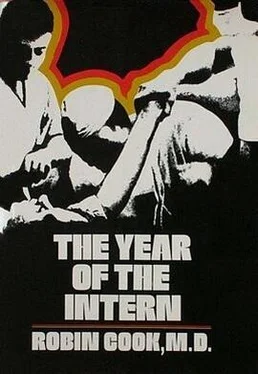Besides, it was still morning; bright sun flashed through the windows, and I felt pretty good. Why spoil it? So, instead of getting angry, I looked perfunctorily at the spots and the scrape, and gave them a few pills. But I drew the line at the welfare paper. I couldn’t tell anything about a bad back with the resources of the ER; and lots of times I’d treat these guys and see them running around on motor scooters the following day.
The next patient, a drunk called Morris, was also a frequent visitor to the ER. His chart read “Intoxicated, multiple bruises”; the description fit. Apparently the man had fallen down a flight of stairs, as was his habit. When I entered the room, he propped himself up on his elbows with great difficulty, his eyelids half covering his pupils, and bellowed, “I don’t want an intern, I want a doctor!” Incredible how such remarks could sink into the tenderest recesses of my brain and cause such havoc. That stupid drunk really hurt my feelings. He made me aware again that I often had to run to the review book for a dosage, that I was scared most of the time, that I had spent four years memorizing a million facts and didn’t seem to know anything. With him, I couldn’t hold myself back. “Shut up, you drunk old fart!” I shouted.
“I’m not drunk!”
“Any more comments like that and I’ll throw you out of here on your head.”
“I’m not drunk. I haven’t had a drink in years.”
“You’re so drunk you can’t even keep your eyes open.”
“I am not.” He practically rolled off the examining table trying to point his finger at me.
“You are so.” Our level of communication was not high. We continued the childish exchange while I examined him roughly, actually bending my reflex hammer as I pressed it against his Achilles tendons but proving he had tactile sense in his lower extremities. I ended up sending him to X-ray, more to get rid of him for a while than to get films of the bones under his bruises.
About that time of the late morning, the number of patients coming in began to exceed the number going out. A bunch of screaming babies arrived together, as if by conspiracy, and were distributed to various rooms. I really didn’t enjoy treating babies. It was rather like my conception of veterinary medicine — zero communication with the patient. Half the time I was forced to ignore the child and try to make some sense out of the mother. Moreover, I found it nearly impossible to hear anything through a stethoscope on the chest of a screaming two-year-old. The usual problems were colds, diarrhea, and vomiting — nothing serious. These kids seemed to anticipate my arrival, saving up so that they could either urinate or defecate while I was examining them.
That Saturday morning was no exception. Children were all over everything, up to their usual tricks. The first baby had had a discharge coming out of its right ear for several days, which the mother thought was Pablum, but she became suspicious when the discharge continued even after she changed the baby’s diet. From the general hygiene of the two of them, I thought possibly it was Pablum, but it turned out to be pus. The baby had a roaring infection in both middle ears, behind the eardrums. The right drum had ruptured, causing the discharge; the left drum was still intact, bulging outward from the pressure behind it. It would have been proper to make a little hole in the left drum to release the pus, but I didn’t know how to do that, and when I talked to the private doctor, he only wanted me to treat with drugs — penicillin, as usual, and gantrisin, a sulfa drug. When I emphasized the seriousness of the unruptured left eardrum, he cut me off, saying he would see the child Monday morning. Dutifully, I wrote the prescription for the penicillin and the gantrisin.
The next baby had not been eating well for a week. Some emergency. The next one had diarrhea, but only once. It seemed incredible to me that a mother would rush her child to the hospital after a loose bowel movement, but one soon learns that nothing is incredible in the ER. A few other children had colds and stuffy noses and mild temperature elevations.
In order to be thorough, I had to look in every ear, down every throat. This work was often more like wrestling than medicine. Children, even young ones, are surprisingly strong, and although I always entreated the mother to hold the child’s arms against its head during the examination, she’d invariably let go and the child would grab for the otoscope, pulling it away and bringing with it a little drop of blood from the ear canal. That made everyone joyous and confident, naturally, but I’d try again, peering into the little hole in the contorting, screaming infant. If any of them had really high temperatures, 104 or over, I’d ask the mothers to give them tepid sponge baths. That morning we had two such cases going. All in all, the ER was sometimes like a pediatric clinic. Of course, there were occasional emergencies, but not as often as the public thinks. Mostly the problems were trivial, stuff that should have been treated in the clinic.
When the odd and horrible thing did happen, the whole staff would become somber and withdrawn for several hours. One morning, a small, dark lady had come in quietly, carrying a small baby in a pink blanket. At the time I hadn’t paid any attention to her, being busy with someone else. A nurse took a clean chart and disappeared with the mother. A few seconds later, she reappeared on the run, saying that I should see the child immediately. When I entered the room, the child was still swathed in the pink blanket. Opening it and pulling it back, I saw a blue-black baby, its abdomen swollen to twice normal size and hard as a stone. I couldn’t be sure how long it had been dead, but I guessed for about a day. The mother sat in the corner, not moving. We didn’t talk; there was nothing to say. I had just looked at the baby, marked the chart, and walked out.
About once a week a pair of hysterical parents charged into the ER with a convulsing child. The child was usually pretty young, and the first time I saw one of those I almost passed out from anxiety. This little girl was about two years old. She lay doubled up, with her arms pressed against her chest; saliva and blood drooled from her mouth, and her whole body shook with rhythmic, synchronous, convulsive jerks. As usual in such cases, the child was out of control of both her urine and her feces. Still terrified, but relieved because the doctor was there, the parents put the girl down on the table. Since they were too hysterical to be of any help, I asked them to wait outside. I also wanted to avoid their judgment of my action — or inaction — for, in truth, I didn’t know what to do. Then one of those great nurses bailed me out by handing me a syringe and offering to hold the child while I tried to find a vein. Suddenly I remembered: amobarbital IV. The next problem was getting the needle into the vein. Even on a quiet, resting child, finding a vein can be difficult. On one who’s convulsing, it can approach the impossible. How much drug to inject was another dilemma, but I thought I’d just give a little and test the reaction. Finally getting into a vein, after several abortive probes, I gave a squirt, and the child’s convulsions suddenly slowed down and then stopped; her breathing stayed strong, thank goodness. My terror of convulsing children decreased somewhat after that experience, especially after I learned to use Valium, or paraldehyde and phenobarbital intramuscularly. But the first time it could have gone either way.
An even bigger scare concerning children had occurred with a seemingly routine case. It served to reinforce my fear that an ordinary situation would deteriorate before my eyes, leaving me helpless. The boy was about six years old, a cute little guy, brought to the scary ER by his overly solicitous parents. He wasn’t feeling too well — that was apparent, because he had vomited three times and had other telltale symptoms adding up to the flu syndrome. For the parents’ sake as much as the child’s, I treated him with an antiemetic drug called Compazine, something I’d used successfully hundreds of time after operations. However, this time I got one of those adverse side reactions you read about at the bottom of the manufacturer’s product information sheet — the type of episode the drug detail men don’t like to talk about and doctors seldom see. Two minutes or so after the injection the child went into a convulsion, his eyes rolled back, he couldn’t sit up unaided, and he developed an obvious rhythmical tremor. The parents were aghast, especially since I had been explaining to them the boy was not very sick. I frantically sedated the child with a little phenobarbital. While I was at it, I probably should have given some to the parents, too, and taken a little myself. I ended up having to admit the child to the hospital. Needless to say, the parents had not been very pleased by this performance, nor had I.
Читать дальше












